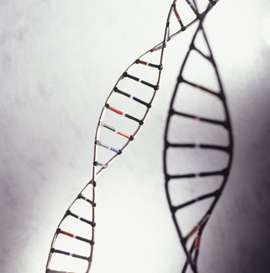Researchers discover novel role of TBK1 protein in cell division

Moffitt Cancer Center researchers have found that a protein called TBK1 plays an important role in the process of cell division, especially at a stage called mitosis.
Cells go through a highly regulated, ordered process to divide and multiply, called the cell cycle. After the parental cell DNA is replicated, the duplicated DNA and cellular organelles are separated into two daughter cells during mitosis. Proper control of the cell cycle is necessary to ensure that the resulting daughter cells inherit identical copies of the DNA.
Thus, the initiation and completion of each cell cycle phase has numerous checks and balances to ensure that DNA replication and chromosome separation occur properly. Any deviation in these processes could lead to cells that do not have the proper number of chromosomes, which could accelerate tumor initiation and progression. Such precise regulation of the cell cycle is lost in cancer cells.
TBK1 is known to contribute to lung cancer development. It has been shown to play a role in cell survival, immunity and malignant transformation. TBK1has been shown to target certain proteins involved in mitosis; however, its precise role in this process is not understood.
Moffitt researchers wanted to increase their understanding of the role of TBK1 in mitosis. They discovered that TBK1 is modified by addition of phosphate groups during mitosis and TBK1 localizes to regions of the cell called centrosomes that regulate chromosomal separation. When they disrupted TBK1 activity, the cells could not separate chromosomes correctly into daughter cells and mitosis could not progress.
The researchers reported that TBK1 directly binds to and activates two proteins called CEP170 and NuMA that are involved in the separation of chromosomes during mitosis. Disruption of TBK1 interactions with either CEP170 or NuMA resulted in defects in mitosis and prevented cell division. This is the first demonstration of TBK1 regulating mitosis and cell cycle progression.
These new findings could have implications for future therapeutic strategies. "This new role of TBK1 opens new avenues for targeting TBK1 in cancer, to induce mitotic catastrophe and cell death," said Srikumar P. Chellappan, Ph.D., chair of the Department of Tumor Biology at Moffitt.
More information: Smitha Pillai et al. Tank binding kinase 1 is a centrosome-associated kinase necessary for microtubule dynamics and mitosis, Nature Communications (2015). DOI: 10.1038/ncomms10072
Journal information: Nature Communications


















